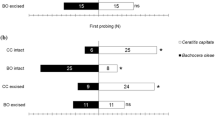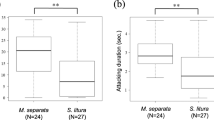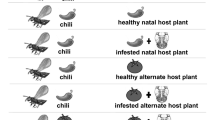Abstract
Learning is generally predicted not to be important in host discrimination by parasitoids, because the stimuli involved are less variable than those used in habitat location. However, Anaphes victus (Hymenoptera: Mymaridae), an egg parasitoid of Listronotus oregonensis (Coleoptera: Curculionidae) apparently learns to associate external pheromones with the presence of a conspecific in a host. In this species, females can reject a parasitized host either after antennal drumming (antennal rejection) or after the insertion of their ovipositor (sting rejection). When they encountered a series of parasitized hosts, females A. victus learned to associate the presence of the external pheromone with the presence of the internal one. Learning lasted less than 4 h and occurred earlier in a series when the female marking the egg and the one detecting that mark were close relatives. This behavior could be adaptive because antennal rejection is faster than sting rejection.
Similar content being viewed by others
Author information
Authors and Affiliations
Additional information
Received: 11 March 1997 / Accepted after revision: 30 August 1997
Rights and permissions
About this article
Cite this article
van Baaren, J., Boivin, G. Learning affects host discrimination behavior in a parasitoid wasp. Behav Ecol Sociobiol 42, 9–16 (1998). https://doi.org/10.1007/s002650050406
Issue Date:
DOI: https://doi.org/10.1007/s002650050406




